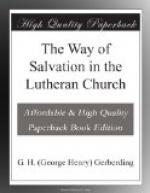Now, as we have shown above, if ever a person needs to be calm and deliberate, it is when about to take the most important step of his whole life. But men don’t generally take important steps, or enter upon decisive movements, when they are excited. When one is excited he is very apt to do the wrong thing, and regret it afterwards.
Not that we object to all feeling in religion. We by no means believe in a religion without feeling. We know of no true piety without deep and heartfelt sorrow for sin, and earnest longings for ever closer union and fellowship with God, together with a childlike trust and a fervent love to Him. We believe, however, that the heart, with its emotions, can only be effectively reached through the understanding. Through the mind we work on the heart. Through the judgment we change the feelings. We appeal first to the intellect, to instruct, to enlighten, to give clear and correct views and ideas, then through the intellect to the heart. When Paul was sent to convert the Gentiles, his direction was first of all “to open their eyes”—that is, to instruct them—and then to “turn them from darkness to light.” Paul was not to begin on the feelings, but on the intellect. But the modern revival system reverses this method. It makes a short cut, and goes at once to the feelings, without first enlightening the mind. This is contrary, not only to the Scriptures, but it is also directly contrary to the science and laws of the mind. It contradicts mental philosophy as well as the Bible.
We believe that where there is the proper instruction in the great saving doctrines of God’s Word, where the mind is properly enlightened to know what sin is, what salvation is, and how it is obtained, there, unless there is a positive and determined resistance to the power of truth, the proper feelings will come of their own accord. It will require no heart-rending stories, no frantic appeals, no violent exhortations to bring them about. But we object to the revival system, because it is almost entirely built up on feeling, and thus reaches only one department of man’s complex nature. Instead of changing the whole immaterial man—his intellect, his sensibilities, and his will—it spends its force on the sensibilities alone.
Our ninth objection we can state briefly. Because the revival system undervalues sound doctrine and instruction therein, and because it depends so largely on feeling, it not only permits but encourages the ignorant and inexperienced to assist in exhorting and helping those who are inquiring after life and salvation.
Those who have scarcely “got through” themselves, who have given little earnest study to God’s Way of Salvation, who do not know the alphabet of Grace, and the means and methods of Grace,—these are often the pretended instructors at the anxious bench and in the meetings for inquirers. Now, we object strongly to such procedures. “Can the blind lead the blind? Will they not both fall in the ditch?” Better let these novices themselves sit at the feet of Christ. Let Christ’s teachers instruct them in God’s Way of Salvation, before they undertake to lead other lost and groping ones.




